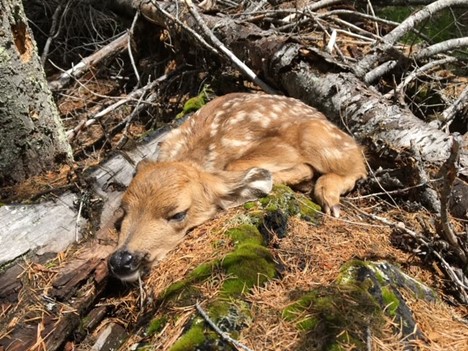You may have noticed more deer popping up in your neighbourhood, sometimes even alone, but WildSafe BC is reminding the public not to get too close.

Deer like to eat a variety of plants — evergreen shrubs, rose bushes, flowers and budding fruit trees, hence why they make their way into some communities and try to coexist amongst humans.
However, there are risks associated with this.
“Deer are especially hard to remove from a neighbourhood once they have established themselves, so it is important to ensure that the deer do not become comfortable in your yard,” WildSafe BC said in a statement.
“Do not feed the deer, you are not helping them in the long run. Make your yard unattractive to them by trimming any cover they may use while travelling or bedding.”

While deer attacks on humans are rare, they are not unheard of, and can lead to serious injuries.

Get breaking National news
“Never approach a deer, especially if it has its young with it,” said WildSafe BC.
“If a deer does attack you, try to stay upright as they inflict injury by striking at their opponent with their sharp hooves. Cover your head with your arms and back off as some form of shelter.”
Urban deer are becoming an increased problem in communities across the province, including the Okanagan. According to the Conservation Officer Service, some people try to “rescue” fawns and other young ungulates, because they mistake them to be orphaned and in need of care.

“Deer fawns and other wild animals should not be touched or moved,” the Conservation Officer Service said in a statement.
“Mother deer may leave their young alone for long periods to avoid attracting predators. When she does return, she can be expected to defend her fawns from real or perceived threats including nearby humans and their pets.”
Unlawful possession of live wildlife will cost you, as fines start at $345.
“Locally each year, Conservation Officers deal with several reports of individuals in possession of live fawns,” said the Conservation Officer Service.

“These individuals were subsequently charged for possession of live wildlife.”
Each year, approximately 4,000 calls are made to the Conservation Officer Service reporting line regarding deer. The service is trying to eliminate these issues by cracking down on individuals who are getting too close to the animals, more specifically the little ones.
“(We) are reminding people that the best thing they can do to ensure a fawns’ survival is to leave the newborn deer fawns alone and leash up their dogs while walking,” said the Conservation Officer Service.
If you see a deer acting aggressively or damaging property, you’re advised to call the Conservation Officer reporting line at 1-877-952-7277.








Comments